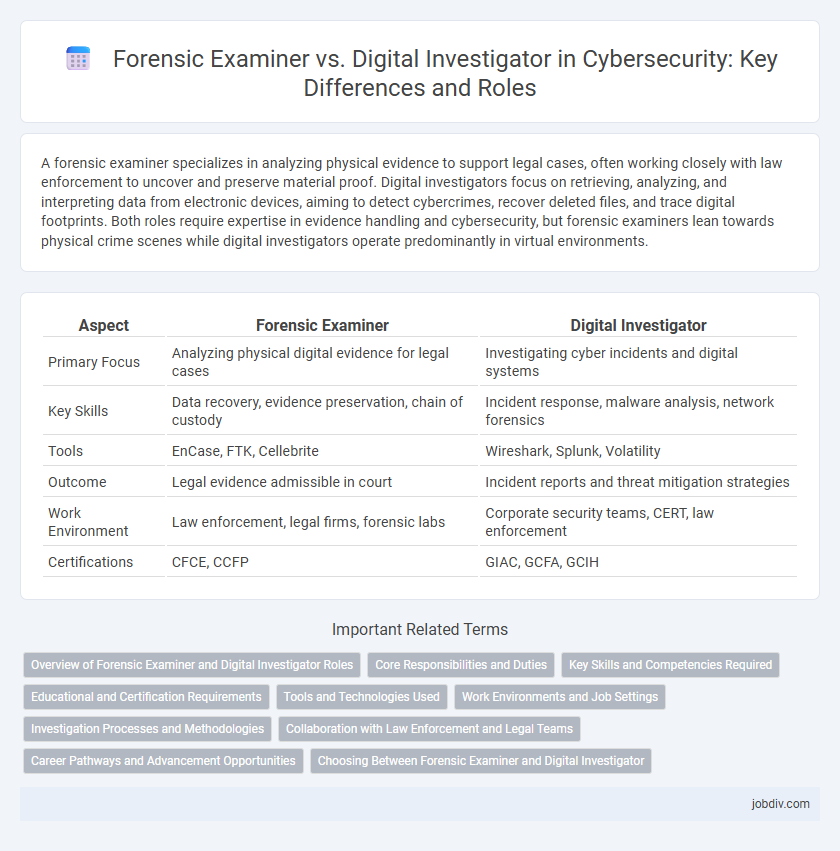A forensic examiner specializes in analyzing physical evidence to support legal cases, often working closely with law enforcement to uncover and preserve material proof. Digital investigators focus on retrieving, analyzing, and interpreting data from electronic devices, aiming to detect cybercrimes, recover deleted files, and trace digital footprints. Both roles require expertise in evidence handling and cybersecurity, but forensic examiners lean towards physical crime scenes while digital investigators operate predominantly in virtual environments.
Table of Comparison
| Aspect | Forensic Examiner | Digital Investigator |
|---|---|---|
| Primary Focus | Analyzing physical digital evidence for legal cases | Investigating cyber incidents and digital systems |
| Key Skills | Data recovery, evidence preservation, chain of custody | Incident response, malware analysis, network forensics |
| Tools | EnCase, FTK, Cellebrite | Wireshark, Splunk, Volatility |
| Outcome | Legal evidence admissible in court | Incident reports and threat mitigation strategies |
| Work Environment | Law enforcement, legal firms, forensic labs | Corporate security teams, CERT, law enforcement |
| Certifications | CFCE, CCFP | GIAC, GCFA, GCIH |
Overview of Forensic Examiner and Digital Investigator Roles
Forensic Examiners specialize in the collection, preservation, and analysis of physical and digital evidence to support legal proceedings, often working closely with law enforcement agencies. Digital Investigators focus on uncovering cybercrimes by examining digital devices, networks, and data to identify unauthorized activities and trace digital footprints. Both roles require expertise in computer forensics, but Forensic Examiners have a broader scope that includes physical evidence, while Digital Investigators concentrate primarily on cyber and network-based investigations.
Core Responsibilities and Duties
Forensic examiners specialize in collecting, preserving, and analyzing physical and digital evidence for legal proceedings, ensuring the integrity and authenticity of data through chain-of-custody protocols. Digital investigators focus on identifying, recovering, and interpreting data from electronic devices and networks to uncover cybercrimes and security breaches. Both roles demand expertise in data extraction, incident analysis, and reporting findings to support law enforcement and organizational cybersecurity efforts.
Key Skills and Competencies Required
Forensic Examiners require expertise in evidence collection, preservation techniques, and detailed documentation to ensure legal admissibility, alongside strong analytical skills for pattern recognition in physical or digital artifacts. Digital Investigators focus on proficiency in cyber forensics tools, network protocols, malware analysis, and incident response to effectively uncover digital breaches and cyber threats. Both roles demand a deep understanding of cybersecurity principles, investigative methodologies, and adherence to chain-of-custody protocols to maintain integrity throughout the examination process.
Educational and Certification Requirements
Forensic examiners typically require a background in computer science or cybersecurity along with certifications such as Certified Forensic Computer Examiner (CFCE) or GIAC Certified Forensic Examiner (GCFE). Digital investigators often hold degrees in information technology, digital forensics, or criminal justice, complemented by certifications including EnCase Certified Examiner (EnCE) or Certified Cyber Forensics Professional (CCFP). Both roles demand continuous education to keep pace with evolving technologies and legal standards in digital evidence handling.
Tools and Technologies Used
Forensic examiners rely heavily on specialized hardware tools such as write blockers, disk imaging devices, and forensic workstations, combined with software like EnCase and FTK for data acquisition and analysis. Digital investigators utilize advanced network monitoring tools, malware analysis platforms, and incident response frameworks, including Wireshark, Volatility, and SOAR systems, to detect and mitigate cyber threats. Both roles leverage encryption-cracking utilities, hash analysis, and timeline reconstruction technologies to ensure evidence integrity and facilitate comprehensive digital investigations.
Work Environments and Job Settings
Forensic examiners typically operate in controlled laboratory environments where they analyze physical evidence and conduct detailed examinations under strict protocols. Digital investigators work in diverse settings, including corporate IT departments, law enforcement agencies, and incident response teams, often requiring remote access to digital systems and real-time data analysis. Both roles demand specialized tools and secure workspaces, but the forensic examiner's environment prioritizes physical evidence preservation, while digital investigators focus on cybersecurity and network forensics.
Investigation Processes and Methodologies
Forensic Examiners prioritize the meticulous collection, preservation, and analysis of physical and digital evidence following strict legal protocols to ensure admissibility in court. Digital Investigators employ advanced cyber tools and methodologies such as network traffic analysis, malware detection, and incident response to identify, trace, and mitigate cyber threats. Both roles share overlapping skills but differ in the scope and techniques used during investigation processes, with Forensic Examiners focusing on post-incident evidence integrity and Digital Investigators emphasizing real-time threat detection and system vulnerabilities.
Collaboration with Law Enforcement and Legal Teams
Forensic examiners and digital investigators collaborate closely with law enforcement and legal teams to ensure the integrity and admissibility of evidence in cybercrime cases. Forensic examiners specialize in collecting, preserving, and analyzing physical and digital evidence, while digital investigators focus on identifying and reconstructing cyber incidents. Their combined expertise facilitates accurate evidence presentation, strengthens legal proceedings, and supports the prosecution of cybercriminals.
Career Pathways and Advancement Opportunities
Forensic Examiners typically start with a background in criminal justice or forensic science, advancing through certifications like CFCE or CFE to specialize in analyzing physical and digital evidence for legal cases. Digital Investigators often hold degrees in cybersecurity or information technology, progressing by obtaining credentials such as GIAC Certified Forensic Analyst (GCFA) and gaining expertise in network forensics and incident response. Career advancement for both roles can lead to senior analyst positions, management roles in cybersecurity teams, or specialization in advanced persistent threat analysis and digital forensics consulting.
Choosing Between Forensic Examiner and Digital Investigator
Choosing between a forensic examiner and a digital investigator depends on the specific nature of the security incident and the type of evidence involved. Forensic examiners specialize in analyzing physical evidence and digital data from devices to uncover crime details, while digital investigators focus on tracking cyber threats, network intrusions, and recovering data from digital systems. Organizations should evaluate their security needs by considering the complexity of the case, the required technical expertise, and the scope of the investigation to select the most suitable expert.
Forensic Examiner vs Digital Investigator Infographic

 jobdiv.com
jobdiv.com